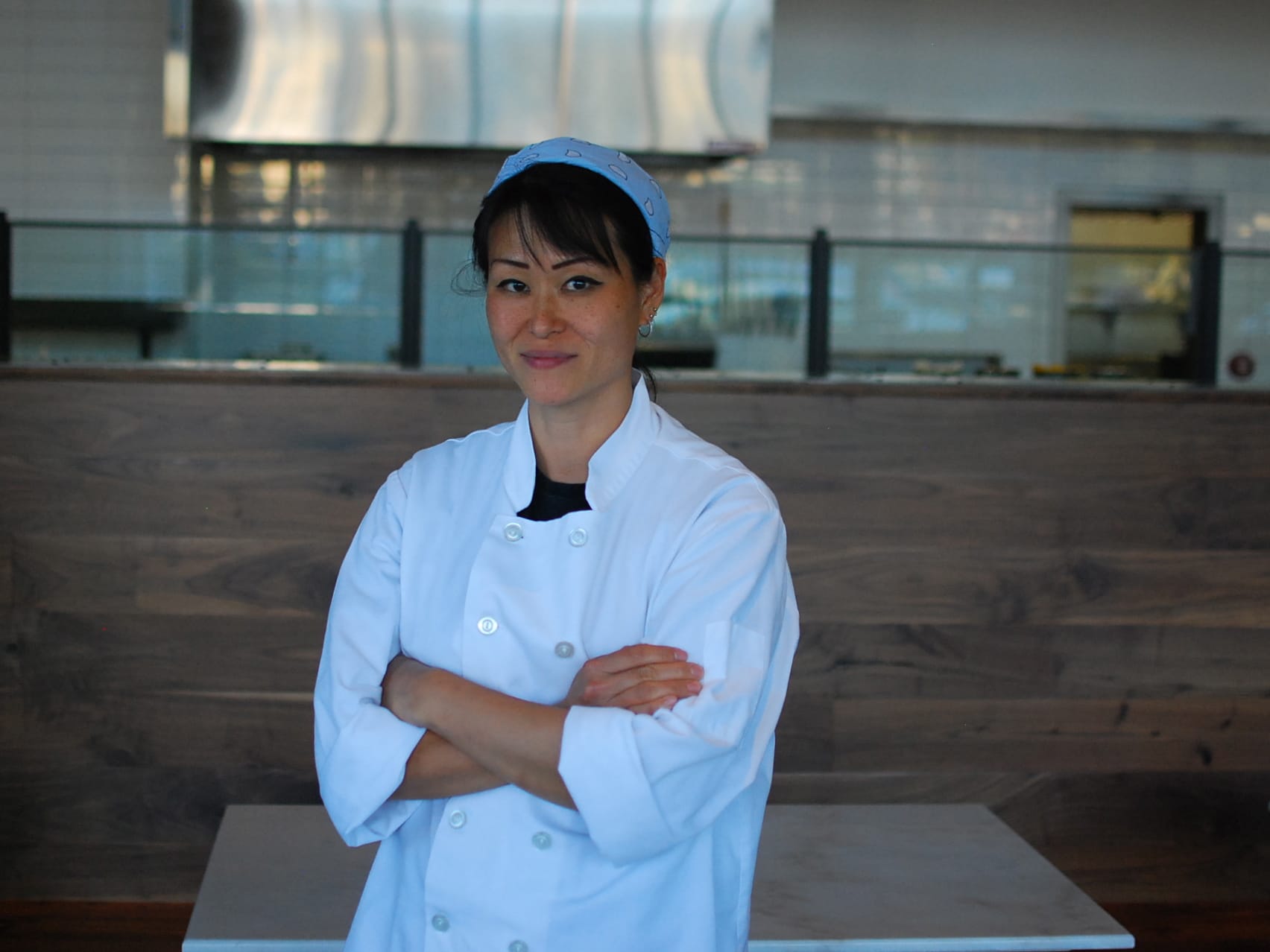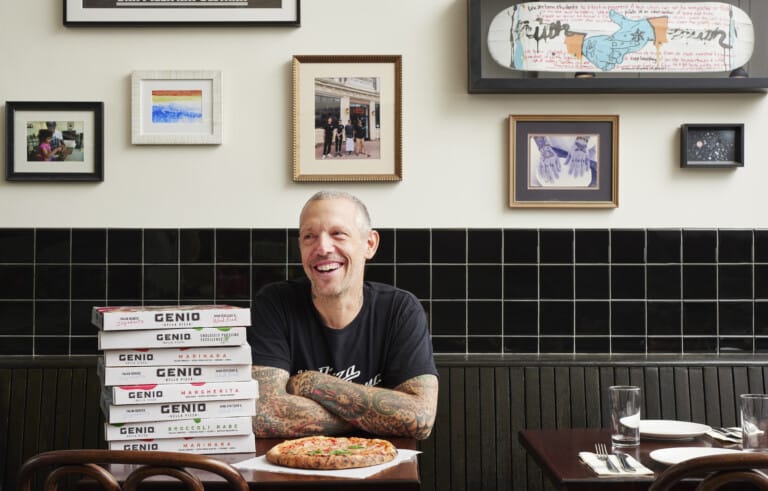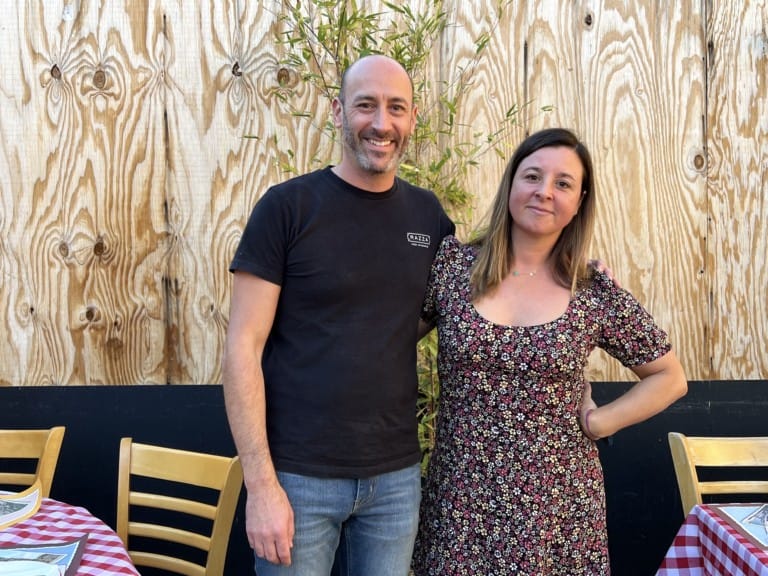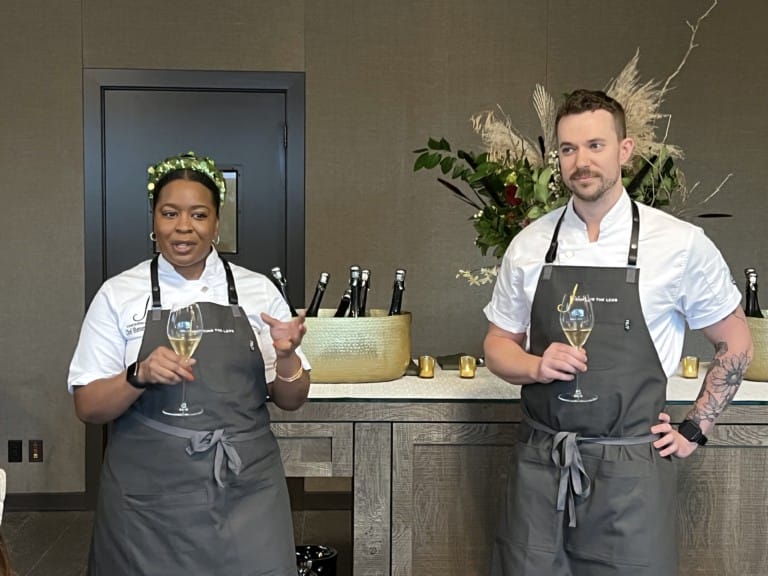Instead of prosecuting torts in Chicago, Judy Han opted to make tarts (and more) in L.A. The once-future-lawyer started in Suzanne Goin’s kitchen at Lucques, worked her way up to sous chef for Chris Kidder at Literati 2, and has spent the past few years as the executive chef for Mendocino Farms, a seasonal sandwich-driven concept that opened its fifth branch at the corner of 3rd & Fairfax on May 31. We spoke with Han on May 17 at the new Mendocino Farms flagship, and she shared insights that hint at how she’s cultivated culinary success.
What’s the biggest challenge about operating more and more locations?
Staff and training, and maintaining quality at all times, and consistency. All of the challenges of running one store are the same challenges in running multiple stores, but really, the key is about staff. If we have the right staff and they understand what we’re trying to do, and they really feel passionate about what we’re doing, then we can maintain everything else. We focus on finding the right staff to produce the food the way we always intended, so whether we do it at one location or five locations, it’s always the same challenges.
What does a sandwich have to be if it’s going to end up on a Mendocino Farms menu, and has that changed since you first opened?
When I first came on board as the chef, it took me a little while. I think we were just starting to develop our identity, but as the years passed, it’s like, when we conceive of a sandwich, all of us, like when we’re having our R&D meetings or corporate meetings, when we come up with a sandwich that just kind of hits the mark, we all know that’s a Mendo sandwich. And it’s exciting when we all get this feeling like, “Yeah, this is going to be a successful sandwich,” and then it proves to be a successful sandwich. That always feels good, but I kind of feel like Mendo, the brand, our customer base drives the type of food that they want to eat. Because we always listen to our customers in terms of what people are interested in trying to eat.
How do you get feedback?
Twitter, Yelp, and Facebook, and e-mails. Every single e-mail, every single Twitter, every single Facebook, we read all of them and we always try to respond back, so it’s a very active relationship we’ve got with our guests.
What’s the key to a great sandwich?
I think balance. Early on in my culinary development, the first restaurant I worked at was Lucques, and Suzanne [Goin], I worked with her for over a year, almost two years. When she composed dishes, she always thought about flavor balance and texture balance. That really stayed with me. Growing up Asian, you eat your rice, but you also have proteins and crunchy vegetables. You also have soup. When you eat Asian food, it’s always super balanced. Even if you’re eating a burger, you want to pair it with something that’s crispy and refreshing, or vinegary, to offset the richness. I’m always looking for that balance, and when I compose that in a sandwich, that’s what I look for. If you have a texture that’s soft, can we provide a crispness to it? If we have something that’s super rich, can we provide some acid? If we have something that’s really heavy on the umami, do we also add something to lighten it up a little bit? That’s what I strive to do with a really great Mendo sandwich.
What do you remember about your very first night at Lucques?
Overwhelmed, because I started there as an intern. When you go from being a home cook who loves cooking, and is passionate about cooking, to being a professional cook, it’s a really big leap, and it’s a completely different world. I think for any intern who’s starting off in the culinary world, it’s for sure overwhelming.
Were you in culinary school at that point?
Yeah, I started culinary school, right about the time of my internship at Lucques, and was offered a job there. But really I consider working in the restaurants, the school. Culinary school forces you to read textbooks and stuff, but working with other chefs and working with peers is the best experience.
Would you consider Suzanne a mentor?
Yeah, she was one of the first mentors, for sure, but I feel like I’ve had many mentors throughout my career.
Who are some of the others, and what did you take away from each of them?
When I was sous chef at Literati 2, Chris Kidder was a mentor at the time, because he had an amazing palate. Just understanding his palate and understanding how he paired flavors was really influential for me.
My co-workers were all sort of mentors, together, for me. It’s the spirit of collaboration. It’s an interesting sort of idea to have somebody who’s a peer also be a mentor, in a way, because you kind of push yourselves to get better every day. That was super influential when I was working at restaurants like Sona and Literati 2. I met some of my best friends working at those restaurants.
And Mario [Del Pero]’s a mentor, obviously, because he is the creator of this company, and I definitely feel like we work together to build this company, but he has different insight. We both challenge each other to grow in different ways, all the time.
What do you look for when you’re hiring somebody to work in one of your kitchens?









Leave a Comment